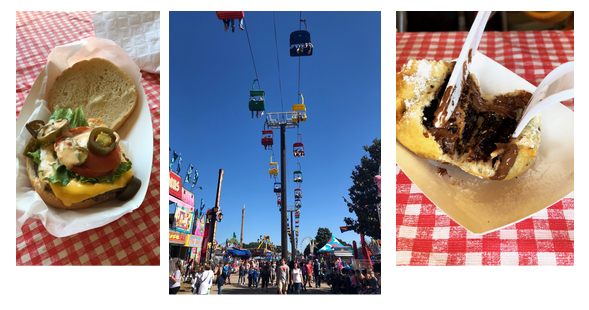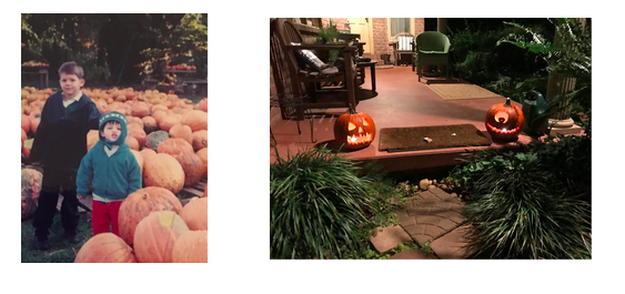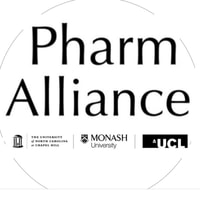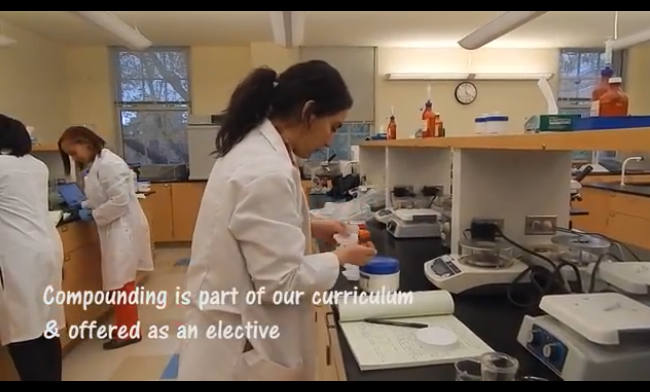|
State Fair October’s in North Carolina can be described as festive, colorful, and delicious. The North Carolina State Fair is an annual 2 week long event that attracts millions of people from across the state who come to indulge in crazy food, check out the largest pumpkin, and end the night with some festive fireworks. Having lived in NC since I was 3, going to the state fair every year has been a tradition of mine. You can find crazy foods such as Krispy Kreme burgers to 8 pound turkey legs all within a short 5 minute walk from one another. My personal favorites from this past year include the deep fried Reese-O (shown below), and a spicy chipotle cheeseburger from a local vender. Some must-ride attractions are the zipper, centrifuge, and the chair lifts (also pictured below). If you have never been to the State Fair, then you should definitely add it on your bucket list to check out next year! Pumpkins
In addition to the state fair, there are many other activities to do once fall roles around. After eating your weight in food at the fair, you will want one that preferably allows to you sit down and my recommendation is to carve a Jack-O-Lantern! Carving a Jack-O-Lantern is one of my personal favorite and longest running Fall tradition since back when they used to be as big as me (shown below). I get whoever I can and bring them out to a local pumpkin patch with me, pick out the best possible pumpkins, and go home and carve it for Halloween (shown below). Jack-O-Lantern’s are a Halloween and Fall staple and can easily become an elaborate and competitive activity. At the Eshelman School of Pharmacy going out to the pumpkin patch is a bonding activity many of the new initiates into the Fraternities partake in. When you first start out carving you might be in for a bit of a shock because you have to hollow out the pumpkin and it’s quite the messy process. However, afterwards is the fun part of carving! After you are done carving you have to take it outside and light it up with a candle on Halloween night (or for the whole month of October). In addition to having used the pumpkin for creating a Jack-O-Lantern, pumpkins are also used as a spice in many fall seasonal items such as a pumpkin spiced latte, pie, and pumpkin bread! Overall, the Fall season in North Carolina offers many exciting and fun seasonal activities. While the leaves change colors, going to the North Carolina State Fair and carving a Jack-O-Lantern is an excellent way to get immersed in the season all in one day! Pharmacy education at Monash Currently at Monash, our degree pathway is changing. When I began university, I entered the Bachelors of Pharmacy straight after completing high school. This degree is 4 years long and incorporates theory and practical components to prepare us for our future career. Students must work as an intern in either a hospital or community pharmacy to gain additional practice experience in the healthcare world to qualify as a practicing pharmacist. After this, they complete the pharmacy board registration exam to practice as a licensed pharmacist. Beginning in 2017, the course of study shifted to a Bachelor of Pharmacy (Honours) /Masters of Pharmacy which students can still enter directly after completing high school but is now a 5 year program. For the 2017 student cohort and onwards, the intern year is incorporated into their degree instead of at the end of the 4 year degree. Education in pharmacy covers a broad range of topics from physics to ethics as the role of a pharmacist is and must be very flexible. At Monash, we have lectures and lab sessions. We even grow bacteria! There are also practical components where students are encouraged to learn how to practice in real life situations. For example, we have OSCE role plays, tutorials with experienced pharmacists, and practical learning through placements in hospitals or community pharmacies. Pharmacy education at UNC ESoP Here at UNC ESoP, students can start applying for pharmacy school as early as their sophomore year of undergraduate studies. Upon submitting all the requirements, selected students are invited to the school for an interview process, also known as candidate’s day at UNC ESoP. UNC ESoP has recently transitioned from traditional interviews to Mini Multiple Interviews (MMI), which consist of seven stations where students have a limited amount of time to discuss the topic for that specific station. Classes at UNC ESoP are organized to help students develop a strong foundation and basic understanding of pharmacy before branching out to take various elective courses, followed by the final 4th year rotation called APPE. With the mindset that the greatest learning curve occurs when students apply their knowledge, UNC ESoP designed the early immersion program that allows students to gain hands-on experience as early as the summer after their first year in pharmacy school, also known as IPPE. IPPE divided into three different immersion experiences spread throughout the first three years of pharmacy school consisting of Health System, Community, and Direct Patient Care Experience. Finally, after all of these experiences, there’s only one other thing left between us and graduating with our Doctorate of Pharmacy (Pharm.D.) degree, which is the North American Pharmacist Licensure Examination (NAPLEX) that every pharmacy student must pass in order to get their pharmacy license. Once completed, students may continue on their pharmacy career path to either apply for pharmacy positions, residency, fellowships, etc. with their Pharm.D. degree. On behalf of UNC ESoP pharmily, I am sending our warmest greetings from the US! Pharmacy education at UCL In the United Kingdom, all students wishing to register as a pharmacist must study the four-year Master of Pharmacy (MPharm.) program. The MPharm. program at UCL gives students an exciting opportunity to study aspects of chemistry and biology: integrating academic knowledge with clinical concepts in order to provide better patient care. During four years of study at university, the central theme is preparing students for practice by taking a holistic approach to education. The course each year is roughly split into four areas. Students study courses in pharmacy practice, chemistry, formulation science and biology using a variety of different teaching styles and methods such as lectures, practicals, tutorials, workshops and seminars. Concepts become more complex with progression through the course with rigorous academic work as part of the student experience. That is being said, the course is rewarding albeit challenging, and keeps the idea of a patient at the heart of all study. Following graduation, each student must complete a 52-week placement in a clinical environment. Upon completion of the placement, students must sit for a final exam regulated by the General Pharmaceutical Council. Successfully passing this exam will allow students to join the register as a fully qualified, practicing pharmacist. |
�
Categories
All
Archives
October 2022
|






